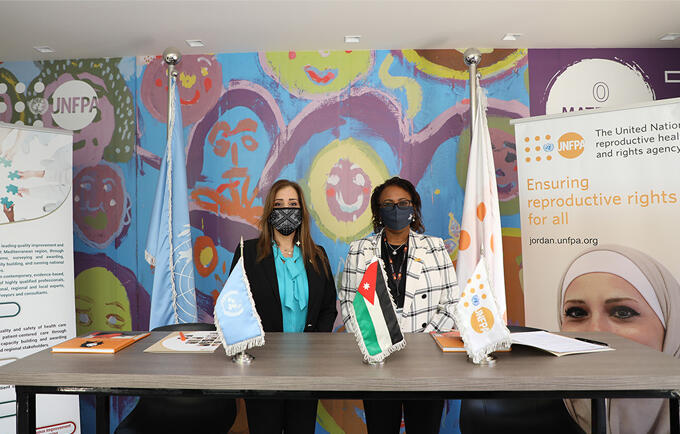Amman - 27 April 2021 - UNFPA Jordan signed an agreement with the Health Care Accreditation Council (HCAC), with a view to raising the quality and safety of health services, in accordance with international standards adopted by the ISQua EEA. The objective of the agreement is to assess integrated and women-friendly sexual and reproductive health services in nine centers across the primary health care system in Jordan. The joint project comprises the design, implementation, expansion, and sustainability of a national accreditation system for comprehensive and women-friendly sexual and reproductive health services within the context of the UNFPA vision to ensure that sexual and reproductive rights are at the heart of development goals. The agreement was signed by Enshrah Ahmed, the head of UNFPA Jordan Office, and Salwa Al Jaouni, the executive director of HCAC.
Enshrah Ahmed stated, “The importance of this agreement comes in the context of UNFPA’s endeavor to ensure an ideal level of quality of the sexual and reproductive health services available in Jordan in a way that fulfils the sustainable development goals”. “The agreement confirms the commitment of UNFPA to support Jordan to fulfill the commitments it made before the Nairobi Summit (ICPD+25), to eliminate maternal deaths, the yet unfulfilled need for family planning, GBV, and harmful practices against women and girls by 2030” She added.
On her part Salwa Al Jaouni, the executive director of HCAC, stated, “HCAC supports the right of women to a safe health care through services centered on promoting quality and empowering women. HCAC has already contributed several projects in this regard, and today as leaders in the field of developing quality systems, we are at the threshold of a new project, to assess the implementation of the accreditation standards of the centers providing integrated and women-friendly sexual and reproductive health services. The aim is to reach an integrated program of national commitment with UNFPA, as an acknowledgment of the solid cooperation relationship between the two parties, something of which we are proud in the context of seeking to provide the best”.
About UNFPA
UNFPA is one the major UN organizations concerned with the issues of population and development, by focusing on sexual and reproductive health, and equality of the two sexes, based on the principles of the international conference on population and development, which was convened in 1994, and the current sustainable development goals.
UNFPA works for ensuring that health and sexual and reproductive rights remain at the heart of the development process. The international conference on population and development provides evidence about the strong link between reproductive health, human rights, and sustainable development. When reproductive health needs are not met, individuals are denied their right to take critical decisions about their own bodies and their future, and as a result, the welfare of their families and future generations are affected. As women are the bearers of children and are predominantly responsible for their feeding, the issues of sexual and reproductive health and reproductive rights should be part of the equality between the two sexes. The denial of these rights exacerbates poverty and inequality.
About The Health Institutions Accreditation Council
The Health Care Accreditation Council (HCAC) is a not-for-profit national institution established in 2007. It develops and improves the quality of the health services, and promotion of principles of patient safety in Jordan and the region, through the development of standards, quality programs, and institutional assessment, with the aim of providing them with accreditation certificates, in addition to seeking to provide advice, capacity building and national awareness. The work of HCAC is informed by the latest and best international scientific practices, implemented by an expert and qualified team, and distinguished and well-trained resident advisors covering different fields.


